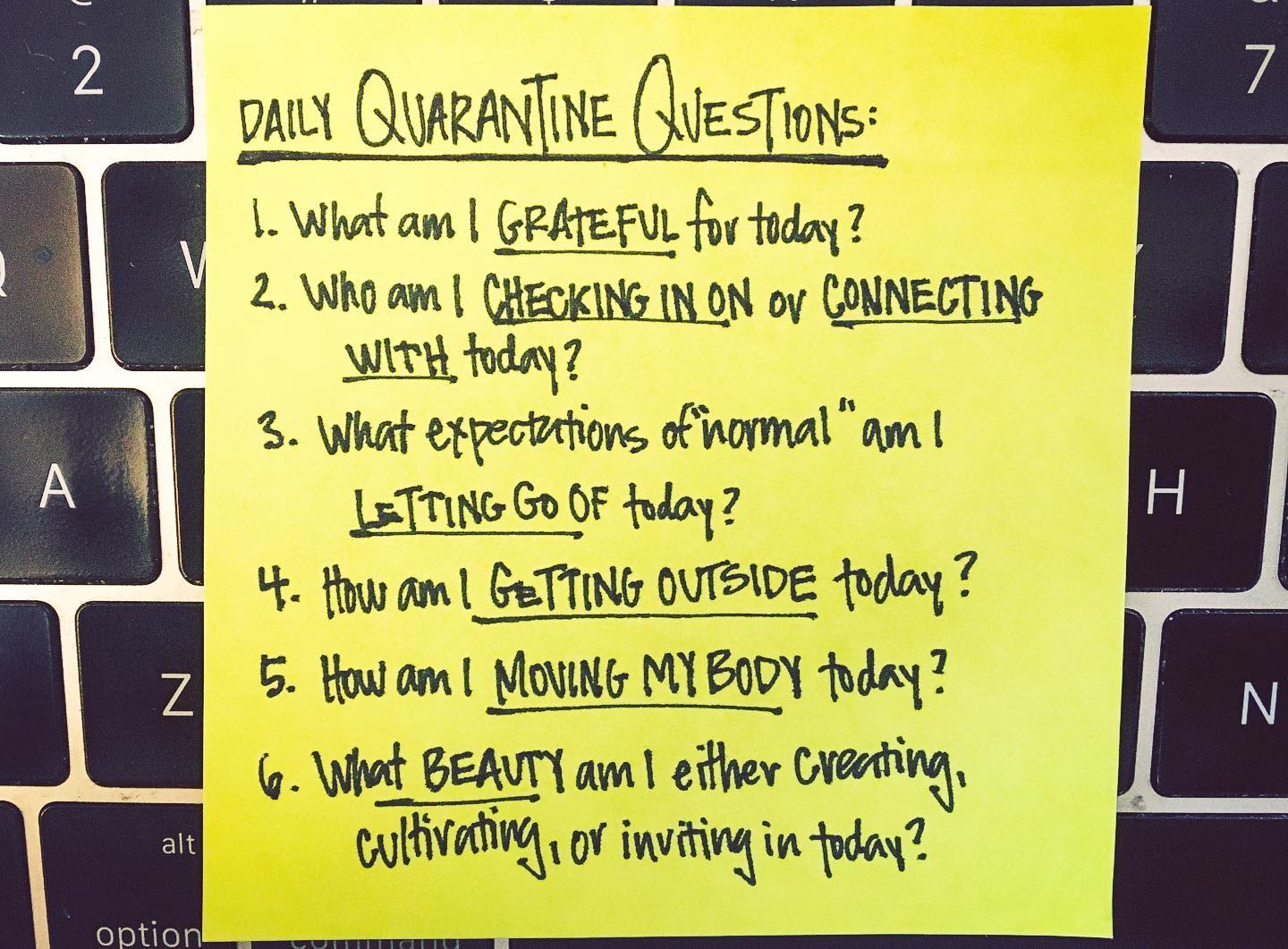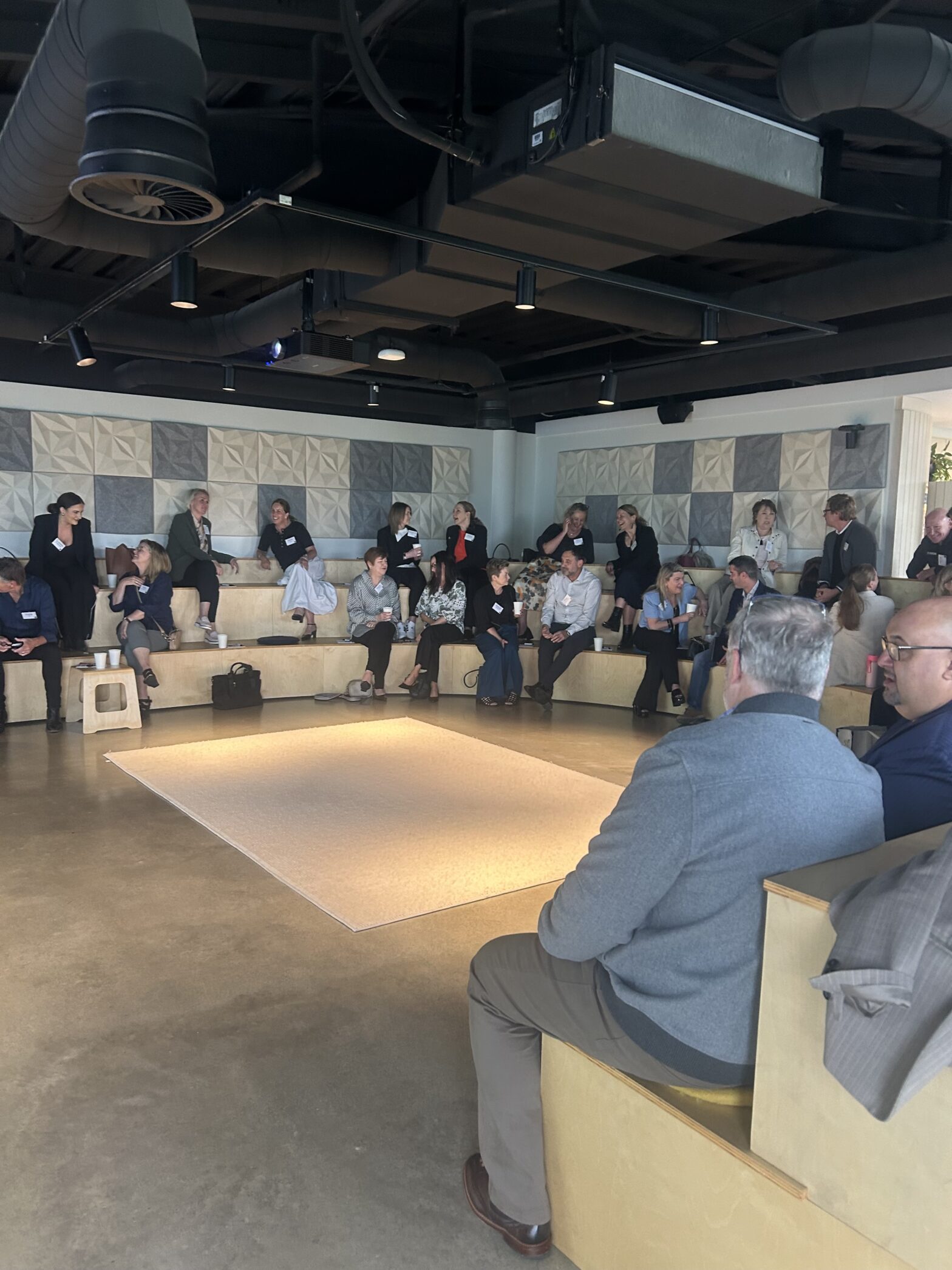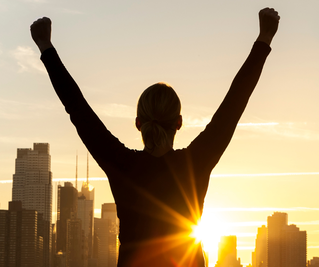If you’re sheltering in place, be sure to check in with yourself.
BY BROOKE ANDERSON | MARCH 24, 2020
As the COVID-19 pandemic spreads, and efforts to “flatten the curve” through physical distancing intensify, many of us find ourselves quarantined at home. The physical isolation and sudden departure from familiar routines can be jarring and disorienting. Settling in for the possibility of an extended shelter-in-place order, I wrote these six “Daily Quarantine Questions” to help me structure my days—and check in with myself, to make sure I’m doing OK. After I shared them on social media, I heard from thousands of people who said that these resonated for them.

Before getting into the questions, I want to recognize that not everyone has the privilege to shelter in place, or to do so safely and with financial security. Health care, grocery, transit, and other essential workers are on the frontline of caring for us, often putting themselves and their families at great risk. Thank you. You deserve not just our gratitude and solidarity, but adequate protective equipment and hazard pay. Many gig and freelance workers like myself, together with small business owners, are suddenly out of work (check out these resources in California). Our unhoused neighbors have nowhere to go. Our incarcerated relatives are also at great risk.
May we remember that it is a privilege to even be safely sheltered at home and asking these questions.
1. What am I grateful for today?
Last month, I heard recently-freed Puerto Rican political prisoner Oscar López Rivera speak at UC Berkeley. Someone asked how he survived 36 years in prison, 12 in solitary confinement. López Rivera responded that every morning he sang Violeta Parra’s song (later popularized by Mercedes Sosa) “Gracias a la Vida” (thank you to life). Our incarcerated family have much to teach us about how to survive extended physical and social isolation, including cultivating a daily gratitude practice, even in the most cruel of conditions. What are you grateful for today? Take two minutes every day to make a list. Add to it throughout the day. If you’d like to record your gratitudes online and share them with others, consider using the Greater Good Science Center’s online journal, Thnx.4.org.
2. Who am I checking in on, or connecting with, today?
As many have rightly reframed it, it’s not social distance we need, but rather social solidarity while we maintain physical distance. Pick three people each day to check in on. Call your grandma. FaceTime your mom. Text your friends (but not your ex!). Check on the neighbors. If you have more to give, the Disability Justice Culture Club is pairing minimally risk-exposed allies with disabled people of color and elders in the San Francisco East Bay who need extra support. Similar mutual-aid networks exist elsewhere.
3. What expectations of “normal” am I letting go of today?
We’re facing down a global pandemic. The nightly news is the stuff of nightmares. Whole states are on lockdown. You’re suddenly either out of work or working from home while simultaneously running a homeschool for rebellious “coworkers” and frantically disinfecting surfaces. It’s OK if you don’t get to inbox zero by the end of the workday. It’s OK if the kids don’t learn anything today, but are still loved and alive by bedtime. Figure out what is actually important to you in this moment and focus on that. Science fiction novelist Octavia Butler, who wrote about resilience and adaptation in dystopian times, tells us, “The only lasting truth is Change.” The faster we let go of expectations of “normal,” the faster we adapt.
4. How am I getting outside today?
Nature, fresh air, and sunshine are good for our nervous systems. While not all of us may be able to get to the redwoods or the ocean, simply leaving the house is helpful. Can you sit in the sun for 10 minutes? Step outside briefly to see the moon as it rises? Even if you cannot physically get outside, can you open a window for fresh air? Or bring flowers inside?
5. How am I moving my body today?
Crisis heightens fear and anxiety. The more we can shift out of our heads and into our bodies, the more grounded we’ll feel. Take a 10-minute walk around the block. Run the stairs in your building. Do five push-ups. If you have limited mobility or fitness, can you roll your ankles in a circle while seated? Massage the tension out of your jaw? Put a hand on your heart to feel its beat?
6. What beauty am I creating, cultivating, or inviting in today?
Beauty is a powerful antidote to despair. Recognizing the beauty in the world and bringing it into our lives is an affirmation of the life that still exists and is worth fighting for. Becoming creators, not just consumers, of culture gives us agency and power. Grace Lee Boggs, the late philosopher and social activist from Detroit, taught us that “a revolution that is based on people exercising creativity in the midst of devastation is one of the great historical contributions of mankind.” So, let’s write about our lives, draw our dreams, sing our sorrows, plant gardens, cook for our neighbors, build rainwater harvesting systems and compost toilets, repair our clothes, and create culture to survive the hard times wherever and however we can.
Lastly, I want to acknowledge that our disabled and incarcerated loved ones have developed so much of the accumulated wisdom about how to stay physically, mentally, and spiritually well in confined spaces. It is the most historically oppressed people who can teach us how to build networks of mutual aid in the absence of state-provided services. Thank you for your wisdom and leadership. May you stay safe and may we honor your lives.
I hope these questions serve you well in the times ahead. I wrote these for myself based on what I know best serve me when I feel panicked, disconnected, or cooped up. The idea is to ask the questions, but not stress the answers. Life under (and—let’s be real—even before) COVID-19 is stressful enough without adding to the to-do list. What you need might be different. What questions would you add to the list?
About the Author
Brooke Anderson
Brooke Anderson is a Bay Area-based organizer and photojournalist. She has spent 20 years building movements for social, economic, racial, and ecological justice. She is a proud union member of the Pacific Media Workers Guild, CWA 39521, and AFL-CIO. She’s on Twitter and Instagram at @movementphotographer.




